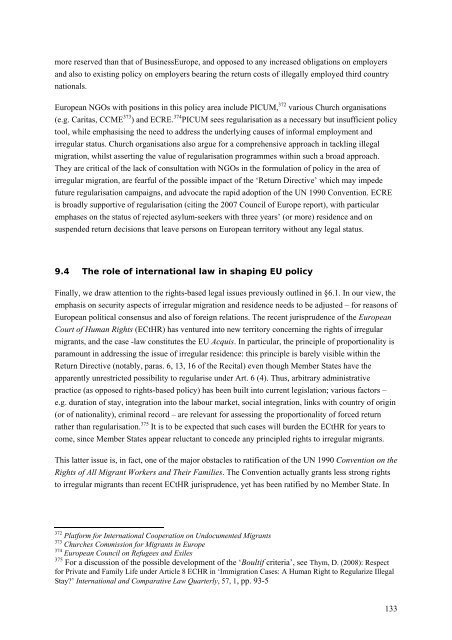REGINE Regularisations in Europe Final Report - European ...
REGINE Regularisations in Europe Final Report - European ...
REGINE Regularisations in Europe Final Report - European ...
Create successful ePaper yourself
Turn your PDF publications into a flip-book with our unique Google optimized e-Paper software.
more reserved than that of Bus<strong>in</strong>ess<strong>Europe</strong>, and opposed to any <strong>in</strong>creased obligations on employers<br />
and also to exist<strong>in</strong>g policy on employers bear<strong>in</strong>g the return costs of illegally employed third country<br />
nationals.<br />
<strong>Europe</strong>an NGOs with positions <strong>in</strong> this policy area <strong>in</strong>clude PICUM, 372 various Church organisations<br />
(e.g. Caritas, CCME 373 ) and ECRE. 374 PICUM sees regularisation as a necessary but <strong>in</strong>sufficient policy<br />
tool, while emphasis<strong>in</strong>g the need to address the underly<strong>in</strong>g causes of <strong>in</strong>formal employment and<br />
irregular status. Church organisations also argue for a comprehensive approach <strong>in</strong> tackl<strong>in</strong>g illegal<br />
migration, whilst assert<strong>in</strong>g the value of regularisation programmes with<strong>in</strong> such a broad approach.<br />
They are critical of the lack of consultation with NGOs <strong>in</strong> the formulation of policy <strong>in</strong> the area of<br />
irregular migration, are fearful of the possible impact of the ‘Return Directive’ which may impede<br />
future regularisation campaigns, and advocate the rapid adoption of the UN 1990 Convention. ECRE<br />
is broadly supportive of regularisation (cit<strong>in</strong>g the 2007 Council of <strong>Europe</strong> report), with particular<br />
emphases on the status of rejected asylum-seekers with three years’ (or more) residence and on<br />
suspended return decisions that leave persons on <strong>Europe</strong>an territory without any legal status.<br />
9.4 The role of <strong>in</strong>ternational law <strong>in</strong> shap<strong>in</strong>g EU policy<br />
F<strong>in</strong>ally, we draw attention to the rights-based legal issues previously outl<strong>in</strong>ed <strong>in</strong> §6.1. In our view, the<br />
emphasis on security aspects of irregular migration and residence needs to be adjusted – for reasons of<br />
<strong>Europe</strong>an political consensus and also of foreign relations. The recent jurisprudence of the <strong>Europe</strong>an<br />
Court of Human Rights (ECtHR) has ventured <strong>in</strong>to new territory concern<strong>in</strong>g the rights of irregular<br />
migrants, and the case -law constitutes the EU Acquis. In particular, the pr<strong>in</strong>ciple of proportionality is<br />
paramount <strong>in</strong> address<strong>in</strong>g the issue of irregular residence: this pr<strong>in</strong>ciple is barely visible with<strong>in</strong> the<br />
Return Directive (notably, paras. 6, 13, 16 of the Recital) even though Member States have the<br />
apparently unrestricted possibility to regularise under Art. 6 (4). Thus, arbitrary adm<strong>in</strong>istrative<br />
practice (as opposed to rights-based policy) has been built <strong>in</strong>to current legislation; various factors –<br />
e.g. duration of stay, <strong>in</strong>tegration <strong>in</strong>to the labour market, social <strong>in</strong>tegration, l<strong>in</strong>ks with country of orig<strong>in</strong><br />
(or of nationality), crim<strong>in</strong>al record – are relevant for assess<strong>in</strong>g the proportionality of forced return<br />
rather than regularisation. 375 It is to be expected that such cases will burden the ECtHR for years to<br />
come, s<strong>in</strong>ce Member States appear reluctant to concede any pr<strong>in</strong>cipled rights to irregular migrants.<br />
This latter issue is, <strong>in</strong> fact, one of the major obstacles to ratification of the UN 1990 Convention on the<br />
Rights of All Migrant Workers and Their Families. The Convention actually grants less strong rights<br />
to irregular migrants than recent ECtHR jurisprudence, yet has been ratified by no Member State. In<br />
372 Platform for International Cooperation on Undocumented Migrants<br />
373 Churches Commission for Migrants <strong>in</strong> <strong>Europe</strong><br />
374 <strong>Europe</strong>an Council on Refugees and Exiles<br />
375 For a discussion of the possible development of the ‘Boultif criteria’, see Thym, D. (2008): Respect<br />
for Private and Family Life under Article 8 ECHR <strong>in</strong> ‘Immigration Cases: A Human Right to Regularize Illegal<br />
Stay?’ International and Comparative Law Quarterly, 57, 1, pp. 93-5<br />
133
















